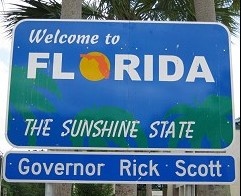Could Florida's new voting laws really change the election?

Florida is the purest of swing states: According to poll-watching websites like FiveThirtyEight, President Barack Obama and Governor Mitt Romney are deadlocked, separated by a mere half-point spread in the polls.
That means it's just the kind of state where restrictive voting laws -- some old, some new -- could easily make the difference.
First, just how tight is the presidential race in Florida? Look at it this way: As of this week, state election officials report the state has just under 12 million registered voters. Assuming about 73 percent of them seek to vote (the average of the last three presidential elections), that adds up to about 8.7 million votes in play.
Assuming those 8.7 million likely voters are divided by the same .5-point margin, that means the spread between Obama and Romney is only about 43,705 votes. For some perspective, that number represents under four percent of the registered voters in Miami-Dade County alone.
So what kind of voting restrictions could swing the vote in Florida? Here are a few examples:
LONG LINES: Record turnout at early voting centers has meant voters waiting in line for up to six hours. But the reason for the long lines isn't just voter enthusiasm: In 2011, Republicans shortened early voting days from 14 to eight, and eliminated early voting on the Sunday before elections.
So far, Gov. Scott -- who signed the new voting rules into law -- has resisted calls to expand early voting hours to meet demand, as his predecessor Charlie Crist did in 2008.
Such inconveniences can definitely have an impact on elections. In the Census Bureau's 2008 voter survey, 17 percent of those who said they didn't vote claimed it was because they were too busy or had conflicting schedules -- a problem magnified by the prospect of multi-hour waits at the polls.
PROBLEMS WITH ABSENTEE BALLOTS: In October, 117 voters in Sarasota County, Florida were dismayed to learn that their mail-in absentee ballots wouldn't be counted. The reason? They forgot to sign the certificate on the back of ballot mailing envelope, another new provision from 2011.
Lawyer Thomas Shults, who runs the Florida Election Law Issues blog, predicts "hundreds if not thousands of Florida absentee ballots will not be counted" because of the law. He notes that:
There is no provision in Florida law which permits a supervisor of elections notify the voter of the error before election day. Moreover, F.S. 101.68(1) states that ”[a]fter an absentee ballot is received by the supervisor, the ballot is deemed to have been cast, and changes or additions may not be made to the voter’s certificate.”
EX-FELON DISENFRANCHISEMENT: Florida has long had one of the harshest laws denying the vote to those with a past felony conviction. As scholars Jeff Manza and Christopher Uggen have documented [pdf], the results of Florida's chaotic 2000 election would "almost certainly have been reversed had voting rights been extended to any category of disenfranchised felons."
In 2007, Republican Gov. Charlie Crist pushed reform, allowing level-I felons to have their rights automatically restored and creating a review process for other ex-offenders. But Gov. Crist reversed course, making the application process for restoring rights tougher, and approving fewer applications that are submitted.
As the Huffington Post reported, the numbers tell the story:
[A]ccording to data provided by the Florida Parole Commission, 153,928 ex-felons had their voting rights restored over Crist's 4-year term. Nearly two years into Scott's tenure, only 255 could say the same.
THERE'S MORE: Election watchdogs say there are plenty of other factors in Florida that could swing the election. Two election researchers recently discovered that those who vote absentee, and then attempt to update their voter information online, will likely have their ballots tossed out. Florida's new laws also require those who are updating their address with Florida to vote provisionally. Palm Beach, Florida discovered thousands of its absentee ballots were defective and couldn't be read by machines.
Florida may or may not turn out to be the decisive state for the presidential election that it was in 2000. But still, it may be disheartening -- at least to Florida voters -- that, 12 years later, the outcome of their elections may hinge on restrictive laws and election administration problems as opposed to the will of the voters.
Tags
Chris Kromm
Chris Kromm is executive director of the Institute for Southern Studies and publisher of the Institute's online magazine, Facing South.
